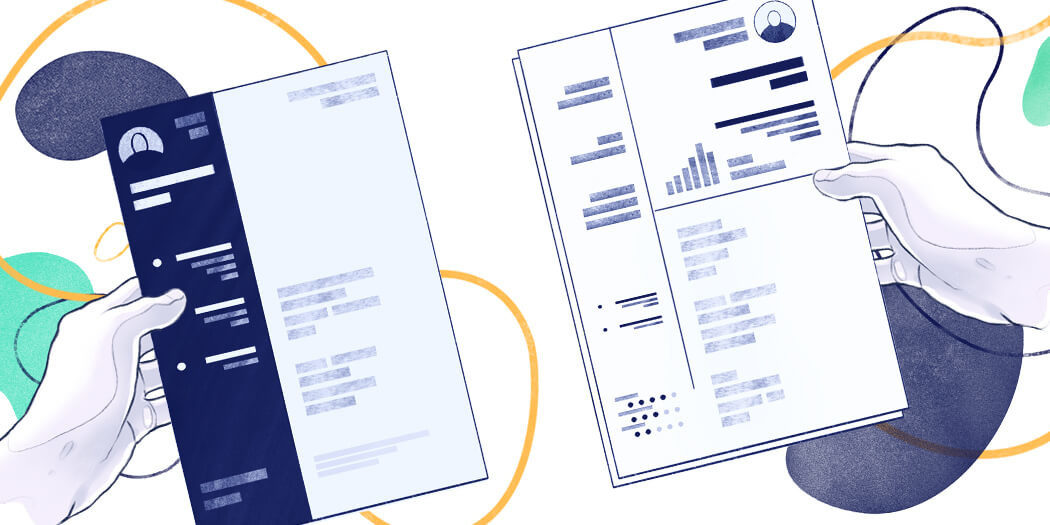
How Long Should a Resume Be: The Best Resume Length
How long should a resume be? One page? Two pages? Does it even matter? We’re here to answer all your questions about resume length!
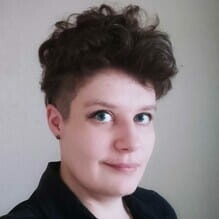
Olga Ber
Career Expert
Many new job-seekers get anxious when they even think of writing the career statement at the top of their resume. What should go there, actually? And since it’s so intimidating, is there a way to get around writing it?
Well, if you’re new to the job market or changing careers, that statement is called your resume objective. And we’ll show you an easy blueprint for writing it (alongside 20+ objective examples)!
With this guide, you will:
Save hours of work and get a job-winning resume like this. Try our resume builder with 20+ resume templates and create your resume now.

What users say about ResumeLab:
I had an interview yesterday and the first thing they said on the phone was: “Wow! I love your resume.”
Patrick
I love the variety of templates. Good job guys, keep up the good work!
Dylan
My previous resume was really weak and I used to spend hours adjusting it in Word. Now, I can introduce any changes within minutes. Absolutely wonderful!
George
In order to write something, you need to understand what it is. So, let's start with the basics:
A resume objective (also known as a career objective) is a short, catchy paragraph at the start of a resume, composed of 2–3 sentences. It should highlight your experience, skills for a resume, and achievments to show that you are the best candidate for the job.
A career objective is one of the most important things to put on your resume. This form of resume introduction is used by hiring managers to quickly decide if they should read more or decline your resume.
Candidates should use an objective for a resume with little or no experience in a given field. That means it should be used by when writing:
If you are none of the above, you should go for a resume summary instead.
We recommend that you write the other sections of your resume before crafting the objective. Once you’ve got your accomplishments and educational background clearly laid out in front of you, it will be much easier to pick key information for the resume objective.
Expert Hint: A good resume objective is closely tailored to the specific job offering: it features the same keywords and focuses on the achievements and skills that are relevant for this particular company.
You may have noticed that the paragraph on top of a resume is sometimes called a resume objective and sometimes a resume summary. What’s the difference?
A resume summary is a statement that highlights your most impressive career accomplishments and skills. Obviously, you need to have those accomplishments in order to write a resume summary, so it’s a good choice for people who already have work experience in their field.
A professional resume objective, on the other hand, is what you write when you don’t have much relevant experience. In a resume objective, you focus on your transferable professional skills and prove that your career goals align with the employer’s business goals.
Both resume objectives and resume summaries typically go on top of your resume. They should be the first thing that catches the reader’s eye. If you’re wondering how to format your resume so that the resume objective is easy to spot, just try out the templates in our resume builder.
In the 90s, people used to think that a professional resume objective meant describing your own career goals. Something like this:
This might be honest, but… would you hire a person who only cares about themselves and wants to leave your company as soon as a better opportunity pops up?
A good resume objective shows that you’re eager to leverage your skills to help the employer achieve their business goals. In other words: it shows that your career goals overlap with what the company wants to achieve. Like this:
This candidate is looking for their first data science job, too. But their resume objective shows that they’re eager to use their current skills to bring genuine value to the employer.
Also, this career objective provides specific proof why this person is worth hiring: they’ve got a solid educational background and they’ve already completed some freelance work. So they’d probably make a good junior data analyst.
Now, how do you make your career objective just as effective?
Here’s how to write a resume objective:
1. Identify one of your strongest traits.
2. Show off your skills and relevant achievements.
3. Explain how you will bring value to the company.
4. Mention the position you are applying to.
5. Keep it short and avoid first-person pronouns
If you follow this formula, your resume will magically be better than most entry-level resumes out there.
Expert Hint: Use keywords from the job ad to describe yourself and your future contribution to the company. If you don’t include any keywords, applicant tracking systems can automatically reject your job application because they’ll think it’s irrelevant!
Check out these career objective examples that helped our users land their dream jobs. Just don’t copy and paste them directly into your resume—always tailor your resume to a specific job offer!
Oh, and don’t forget to include a cover letter alongside your resume, preferably in a matching design.
The ResumeLab builder is more than looks. Get specific content to boost your chances of getting the job. Add job descriptions, bullet points, and skills. Easy. Improve your resume in our resume builder now.
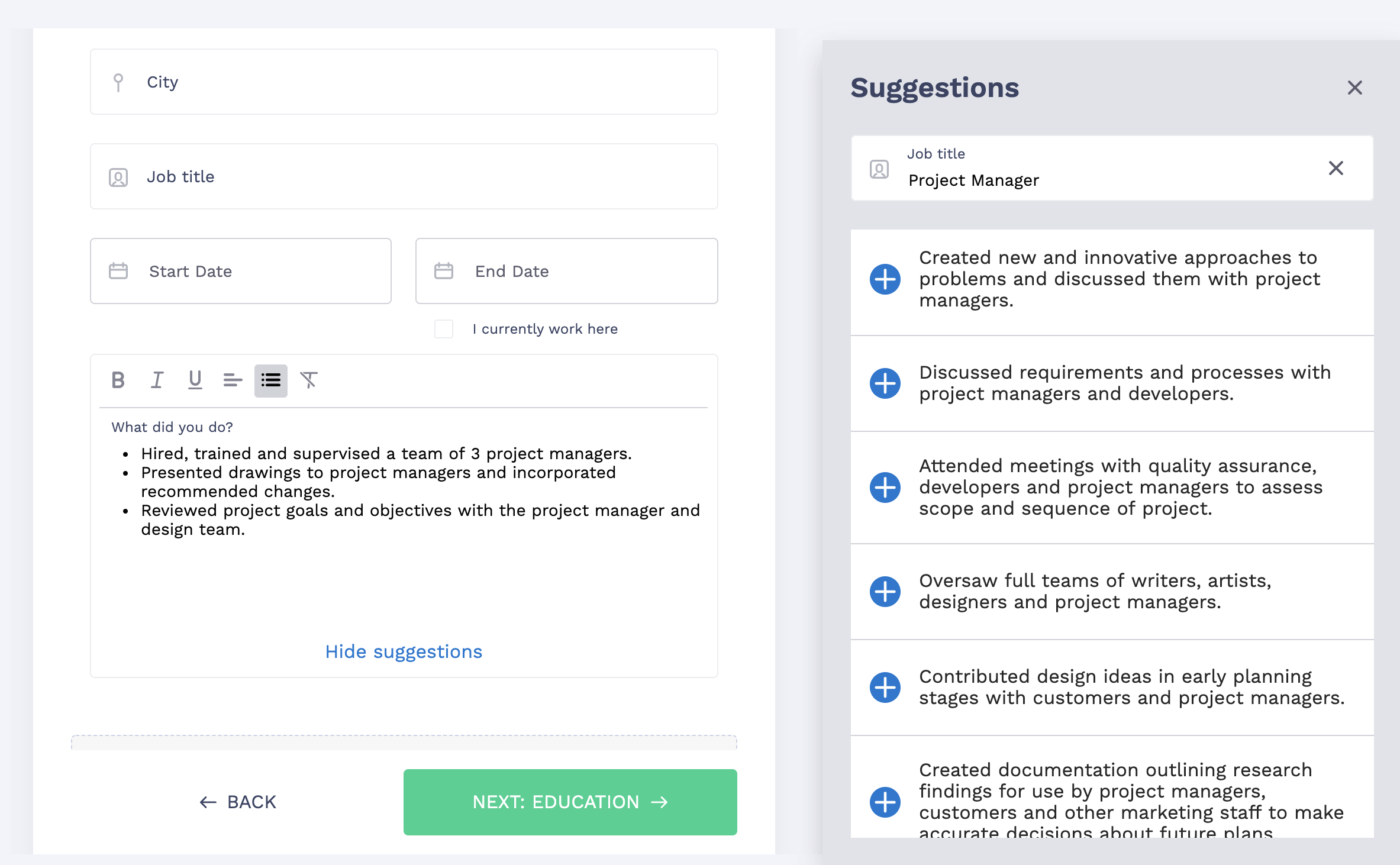
Nail it all with a splash of color, choose a clean font, and highlight your skills in just a few clicks. You're the perfect candidate, and we'll prove it. Use our resume builder now.
When writing an internship resume, focus on any important things you’ve achieved during your studies or in your freelance work. This will set you apart from all the other interns who typically write things like “please hire me, I want to learn something”.
Energetic computer science professional with proven skills in Java and app design. Seeking to support Google’s software engineers in their innovative projects. Created two eCommerce sites with 100% client satisfaction. Updated a mobile website with 50,000 monthly users 3 days ahead of deadline.
On a resume for an administrative assistant, list any temporary work or other jobs that involved admin and office tasks.
Hard-working administrative assistant with proven skills in MS Office and billing. Have performed CRM data entry on hundreds of customer orders with zero errors. Composed 50+ office documents with MS Word. Eager to ensure the smooth running of Altshiftia’s office.
Writing a receptionist resume? Make sure you mention any previous jobs that built on a similar skillset.
Friendly, efficient receptionist, skilled in taking phone calls and MS Office Suite. As team member at Ruby Tuesday, handled 10+ phone orders per shift and collaborated with 30+ team members to maintain 96% customer satisfaction ratings. Seeking to provide front desk duties at Darrell McGehee Dental Clinic and maintain its excellent reputation.
When writing an office manager resume, don’t hesitate to describe what you achieved in other office jobs. The hiring manager will know that you’ve got what it takes.
Task-oriented personal assistant with 2+ years experience working for a top-level executive in the finance industry. Skilled with organizing complicated documents, balancing budgets, and handling all manner of administrative tasks. Reduced expenditures by 18%. Seeking to utilize exceptional organizational abilities to become the office manager for Targetmaxx Quintillion Corp.
Your secretary resume objective should prove that you’ve got the skills for the job—even if you’ve never worked as a secretary.
Reliable college graduate with proven MS Office expertise. Assisted my college department with paperwork and project management. Ready to leverage organizational skills to provide administrative support to the students and staff at Applebite School.
No one will hire a manager who has zero leadership skills and doesn’t know how to contribute to specific business KPIs. Your manager resume must prove that you’re a born leader and an insightful manager who knows how to boost business metrics.
Hard-working Business Management graduate with a specialization in sales and marketing management. President of the Undergraduate Student Board 2016–17. Looking for an Assistant Digital Manager position with Heinz to apply strong data analysis skills and digital marketing insights to help increase online traffic and sales.
When writing a marketing resume, show that you’ve got an essential marketing skill: crafting a unique value proposition. Be specific and make an irresistible promise.
Analytically-minded marketing specialist with an MBA in Marketing from UCLA, Anderson School of Management (GPA 3.9). Conducted numerous marketing experiments, leading to a 25% increase in conversions in one case. Eager to join Minas Morgul Inc. to help boost key marketing metrics by implementing data-driven marketing optimization strategies.
Your sales resume must do one thing: get you that coveted job interview. But it will never close the sale without a powerful resume objective like this one:
Highly-motivated sales representative with a BA in Psychology (GPA 3.7). Part-time sales experience with Pharmaton for 1.5 years. Established and maintained relationships with 20+ key clients. Eager to leverage my skills to boost Kite Pharma’s sales volume and revenue while maintaining its excellent reputation among customers.
Do you have what it takes to be a customer service rep? Show it in your customer service resume! Hint: it doesn’t need to be work experience as a customer service agent. Mention what you’ve learned during your studies or internships.
People-oriented psychology student, trained in conflict resolution and communication skills. Eager to join Greenblob Inc. to build customer loyalty by leveraging interpersonal skills and offering top customer service.
When writing a call center resume, give specific proof of your communication skills and show that you genuinely care about the company’s customers. No one would hire a call center person who doesn’t care about their job.
Energetic call center agent with experience as call center temp (15% above average appointment-setting rate). At two non-call-center jobs, handled 20 inbound calls per day with 3 customer service awards and customer rankings of 95%+. Seeking to support Optimora’s customers and help them enjoy their product experience, maximizing their loyalty and collecting valuable feedback.
Applying for a cashier job? Prove that you’ve got the necessary hard skills, qualities, and certifications and put them right on top of your cashier resume.
Efficient cashier, skilled in POS and communication. As a waitress at Pizza Hut, ran cash drawer on occasion during busy times. Maintained 95% positive customer comment card scores. Certified Customer Service Professional (CCSP) and certified in First Aid, CPR, AED.
Your accounting resume objective should offer hard proof that you’ve got the necessary qualifications to be an accountant and the skills to be a good accountant. And remember that in accounting, the best proof is numbers.
Results-driven CPA with solid budgeting and reconciliation skills. Passed CPA exam with score of 99 in 2 sections and 94+ elsewhere. Worked as CPA consultant to two businesses, prepared 18 tax returns, and streamlined the accounting process for a hardware business. Seeking to assist the accounting team at Penvelope Inc in maintaining accounting best standards.
Why would anyone hire a financial analyst or advisor? To improve specific financial metrics, of course. Make sure your entry-level finance resume objective shows that you’re the right person for this, even if your previous job titles didn’t have the word “finance” in them.
Highly motivated entry-level financial analyst with over a year’s experience in data analysis. Seeking opportunity to help Company ABC increase its margins across the board. At Avondale Systems, compiled over 1 GB of data to generate 20+ financial reports. Collaborated with cross-functional teams to reduce open purchase orders by 13%, saving $1.1 million.
Getting your foot in the door as a newly licensed nurse can be tricky because there are so many candidates with the exact same qualifications. Win a competitive edge by writing a nursing resume that contains keywords from the job ad and clearly highlights the most relevant skills.
Dependable licensed RN trained to work in high-stress environments and stay calm under pressure. Seeking to leverage meticulous record-keeping and analytical skills to maintain and improve patient care standards at Greenbaum Medical Center.
Applying for your first dental assistant job? Your dental assistant resume will need an objective that clearly states your qualifications and previous experience (like volunteering and internships). Like this:
Newly certified, energetic dental assistant with experience volunteering for two different dental practices and a 95% patient satisfaction rate. Member of PA Dental Assistant's Association. Eager to assist the team at YourNewSmile in preparing dental procedures and providing top-notch patient experience.
Start your social worker resume with an objective that proves your skills and shows your passion for social work. Mention your volunteer experience and you're golden.
Compassionate social worker with skills in counseling and crisis management. As volunteer child social worker at Blakely Ridge Ranch, provided on-call assistance and coaching for 16 children, including 4 persons in a mental health crisis. Eager to assist clients at Strother Regional Life Strategies in achieving their treatment goals.
Looking to get your foot in the door of the HR office? Make sure your HR resume is perfectly crafted—even if it’s your first HR job. In the resume objective, focus on your previous experience with managing people and on your certifications, if you have any.
Retail store shift supervisor with newly-minted PHR certification and 2 years’ experience managing employees of a fast-paced shop. Seeking to leverage proficiency in cross-cultural communication and leadership development to support HR processes at 8-Char.
Even if you’ve prepared a full-blown GitHub portfolio in order to impress the recruiters, you still need a resume. And a resume objective, too. In an entry-level computer science resume, it’s best to focus on freelance projects that are somehow relevant to the job you’re applying for.
Well-versed computer science enthusiast with proven skills in data science. Took 1st place in TopCoder Coding Challenge, January 2017. As a freelancer, built a real-time tax forecaster and a spam classifier with Python. Eager to join the software development team at Snakey Apps Inc and collaborate on upcoming software projects.
One does not simply begin an engineering resume with “Trust me, I’m an engineer”, especially when applying for an entry-level position. You need to show why you’re qualified for the job, how you’ve leveraged your engineering skills in the past, and how you’re going to help your new employer grow their business.
Enthusiastic engineering college graduate (GPA 3.8) with freelance experience in consulting small manufacturing businesses and optimizing their production processes. In one case, cut production costs down by 30%. Eager to leverage my skills to support and optimize production at Packagento, increasing revenue and cutting costs without compromising quality.
Applying for your first job as a food server? Craft an objective for your waitress resume (or waiter resume, whatever you identify with) that proves your excellent people skills and knowledge of food safety practices. Like this:
Personable college student with 2+ years experience as a part-time, weekend barista. Earned the “Barista of the Month” award 3 times in 2020 and 2022. Seeking to leverage great customer service skills and knowledge of food handling and safety to provide an excellent dining experience to patrons at Henibana’s Steakhouse.
The ideal electrician resume should spark immediate interest, even if you’re just one out of 150 similarly qualified beginner electricians. To stand out, craft a resume objective that focuses on what you’ve achieved during your training:
Efficient journeyman electrician with skills in maintaining and troubleshooting high and low voltage electrical systems. Seeking to provide fast, safe maintenance at Harwich Granular. At Pinecone Sage, worked on VFD and variable speed drive components. Cut machine downtime 30% through Total Productive Maintenance.
All the little kids on the block are going to envy you because you’re about to drive the biggest truck they’ve ever seen. That’s because you wrote a truck driver resume with a clear objective that showed exactly how your previous driving experience makes you an excellent trucker.
Licensed truck driver with skills in flatbed tarping and vehicle maintenance. As dump truck driver at Castle Rock Stone, drove quarry truck 5 days per week in 10-hr shifts with 95% on-time delivery. Seeking to deliver on time for Berube International and its clients.
A teacher assistant resume sounds like a daunting writing assignment, but it shouldn’t be. If you’ve volunteered at a school or worked with young people in some other capacity, feel free to include these experiences in your resume objective.
Helpful teaching assistant, skilled in mentoring and grading papers. Created 5 monthly lesson plans as substitute teacher at Madelia High School, received 80% positive feedback from students. Seeking to take a load off teachers at Madelia Elementary School.
Looking to become a nanny but wondering if your lack of formal experience could be an obstacle? Craft a nanny resume with an objective that describes any similar activities you’ve done in your life, like taking care of younger family members.
Hard-working entry-level nanny, skilled in child care and planning an active calendar. Have worked extensively providing part-time nanny services for 5 nieces and nephews ages 1–9 for 7 years, including planning and preparing healthy meals, planning activities, and providing transportation. Seeking to provide excellent care for the Davalos family.
Double your impact with a matching resume and cover letter combo. Use our cover letter generator and make your application documents pop out.
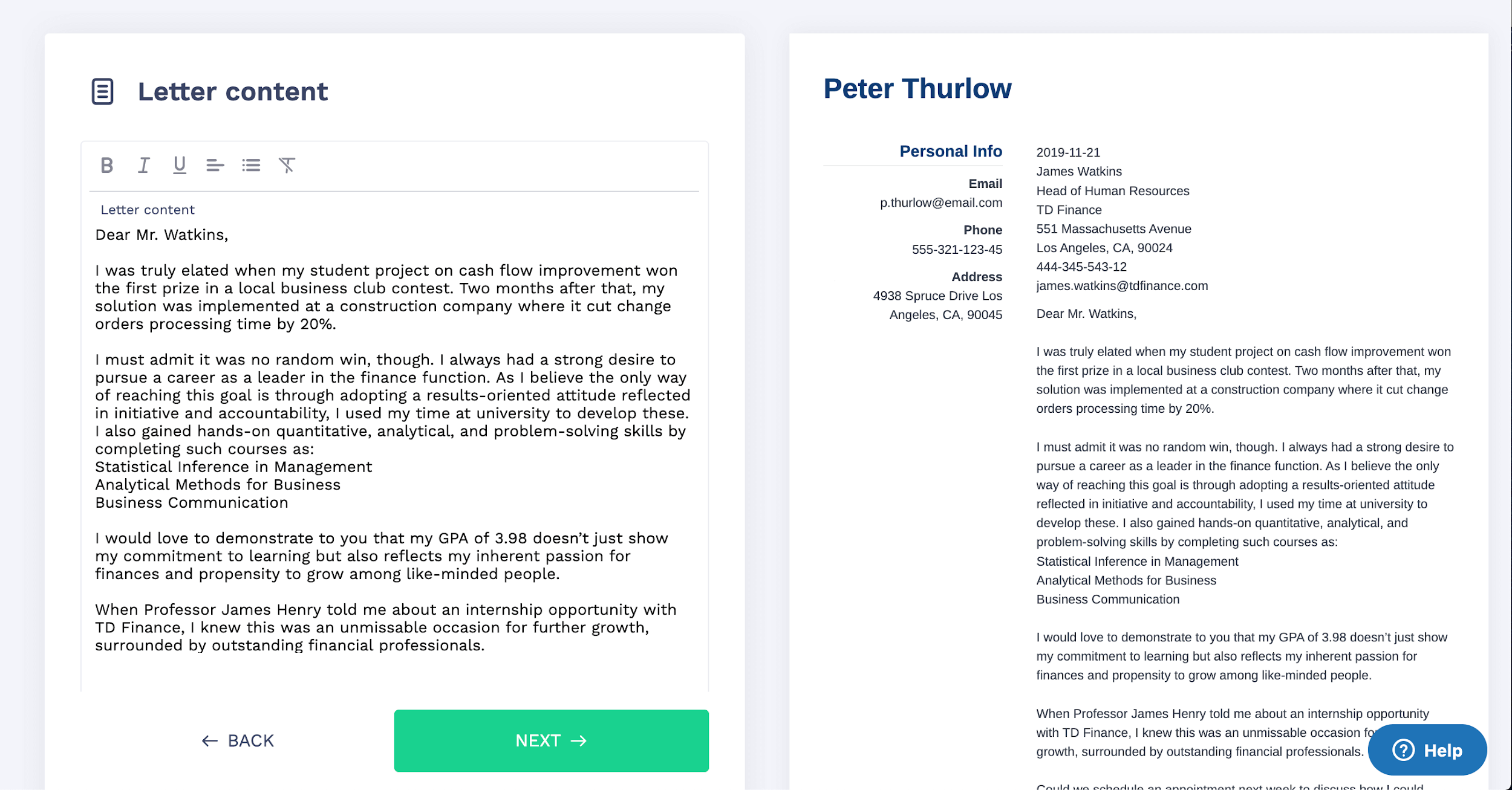
Want to try a different look? There's 21 more. A single click will give your document a total makeover. Pick a cover letter template here.
If you’re writing a resume for your first job or starting a new career, your resume will benefit from a resume objective. It’s a statement that explains how your skills and background will help you achieve the employer’s business goals.
Here’s what you should remember when writing your objective for a resume:
Got questions or comments on how to write a resume objective? Not sure how to get this resume advice to work for your career objective scenario? Scroll down a bit further and get at us in the comments. We’d love to hear from you, and thanks for reading!
At ResumeLab, quality is at the crux of our values, supporting our commitment to delivering top-notch career resources. The editorial team of career experts carefully reviews every article in accordance with editorial guidelines, ensuring the high quality and reliability of our content. We actively conduct original research, shedding light on the job market's intricacies and earning recognition from numerous influential news outlets. Our dedication to delivering expert career advice attracts millions of readers to our blog each year.
To write a good resume objective, follow this formula:
Make sure your resume objective uses the same resume keywords as the job advert. If possible, use numbers to describe your accomplishments.
You need an objective statement on your resume if:
If you're an experienced candidate who's not starting a new career, opt for a resume summary instead. In a resume summary, you offer a brief glimpse of your key career achievements and skills.
Even if you don't have relevant work experience to put on your resume, you still need to prove that you're the right person for the job. Pepper your resume objective with resume keywords describing your skills, qualities, and educational background. Also, show that you’re passionate for the job you're applying for.
The word "objective" means "goal" or "purpose". A resume objective is a short statement that shows how your professional skills, qualities, and career goals can help your new employer achieve their business objectives.
Resume objectives usually appear at the top of a resume, before the work experience section. To learn more, check out our guides to resume formats and resume layouts.
A resume should always have an opening statement, AKA a resume profile. This helps the resume get past ATS (automatic filters) and attract the attention of hiring managers.
This statement is either a resume objective or a resume summary:
If you're writing a resume for your first job or changing careers, opt for a resume objective. If you're a seasoned professional, write a resume summary instead.

How long should a resume be? One page? Two pages? Does it even matter? We’re here to answer all your questions about resume length!

Olga Ber
Career Expert
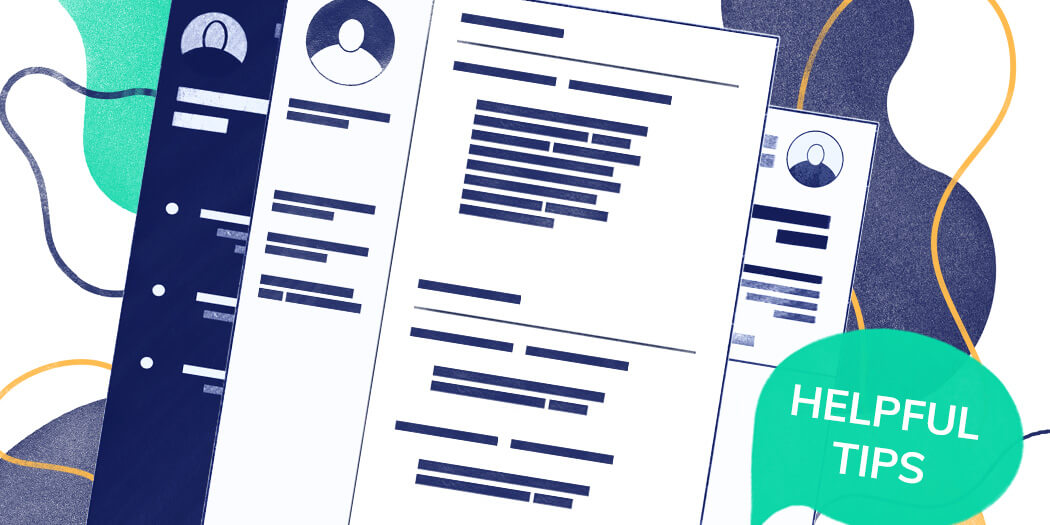
You can stop searching—this is the ultimate collection of best resume tips that can help you succeed in 2026. These resume writing tips will help to impress hiring managers.
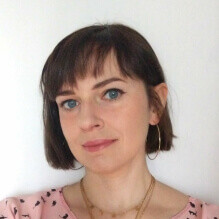
Roma Konczak, CPRW
Certified Professional Resume Writer, Career Expert

Can a resume be two pages? Or should you always make it shorter? The best answer: if your relevant and eye-popping achievements can’t fit on one page, write a 2-page resume.

Tom Gerencer
Career Expert